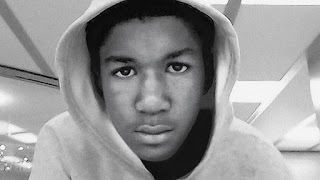Rest in Power: The Trayvon Martin Story
On February 26, 2012, a teenager by the name of Trayvon
Martin, was fatally shot in small gated community outside of Orlando, FL. A
middle aged Hispanic male named George Zimmerman was identified and charged as
the shooter. The conflict started because the African American teen was seen
walking in the community wearing a black hoodie, and without hesitation the
former military man decided to take the "law" in his hands. Accusing
Martin of disturbing the community led to a physical conflict which ended with
the death of the teen by gunshot. The tragic murder of the innocent teen spread
like wild fire exciting racial tensions throughout America. After Zimmerman was
acquitted of all charges the outrage in the black community influenced the
Black Lives Matters movement and protest. Since then cases all over the U.S.
increased with Black people becoming victims of racially charged crimes
including police gun violence, such as; Sandra Bland, Michael Brown, Stephon
Clark, Kalief Browder, and so many more. Unfortunately, as history writes
itself before our eyes, the Trayvon Martin Story will ultimately mark itself as
the turning point in modern injustice that many THOUGHT were eliminated after
the election of President Barack Obama in 2008.
The 6-part doc-series, Rest in Power: The Trayvon Martin
Story recounts the teens life, discloses case files, events leading up to the
tragedy, and after George Zimmerman's acquittal. The filmmakers Jenner Furst
and Julia Willoughby Nason ways thoroughly in on interviews conducted, with key
players, including Mr. Martin’s family and Mark O’Mara, the lead defense lawyer
for Mr. Zimmerman, the directors zero in on what they see as a flawed criminal
justice system. The filmmakers and Mr. Martin’s parents hope “Rest in Power,”
which debuts Monday July 30th, on the Paramount Network, moves Mr. Martin
beyond the realm of symbolism and demonstrates the costs of ignoring these
issues. “I hope people walk away knowing who Trayvon Martin really was,”
Sybrina Fulton, Mr. Martin’s mother, said.
“I want people to walk away having a clear view of what this
country is about right now, and not what they thought it is,” she added.
Jay-Z executive producer of the series expresses his
position on the justice system, and our obligations as a people to progress
pass the racial division. This would be Shawn Carter's second documentary
produced, the first one titled Time: The Kalief Browder Story, about a teen
illegally retained at one of the world’s worst prisons, Rikers Island, for 3
years without a trial. The teen endured the horrible treatment, brutality, and
even solitary confinement during his years in prison, for a crime that he was
later found innocent of. The teen was released from Rikers as an adult, he was
traumatized and committed suicide because everything he encountered. No one was
charged for illegally abducting the teen which led to his death, again another
tragedy that no one was held accountable for. Jay-Z expresses his emotions
behind these crimes and the justice system, in which he hopes these
documentaries will increase enough media support and awareness to possibly
change the unjust justice system.
"The system doesn’t work as it exists today. No one
wants to talk about that because it’s as if you are bashing police officers.
I’m not bashing police officers. I’m just saying the facts do not support this
being the answer, the system as it stands today."
Many people say that celebrities should be held accountable
for how they react and inform the public. Although Jay-Z doesn't agree with
statements that believe celebrities should use their platforms as activism, he
willingly has supported such causes. Entertainers are people that chose a job
that doesn't have activism in the requirements, that's a personal decision. If
we as a people will not stand against unjust acts, why are we requiring others
to do so, who generally are not affected by something that we are?




Comments
Post a Comment
Share Your Thoughts